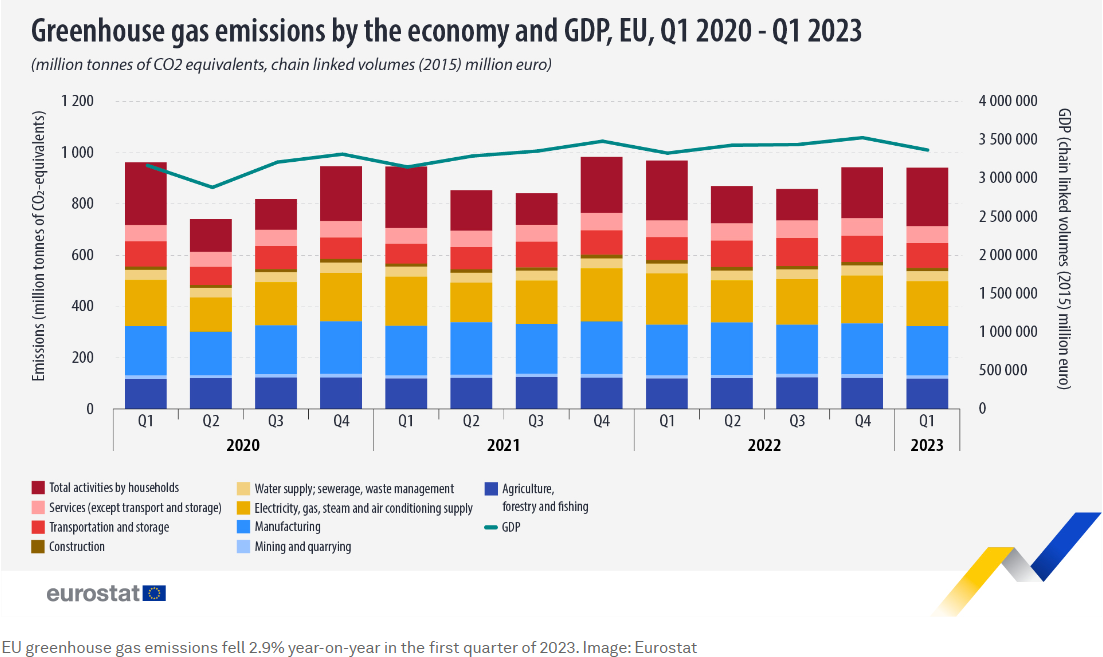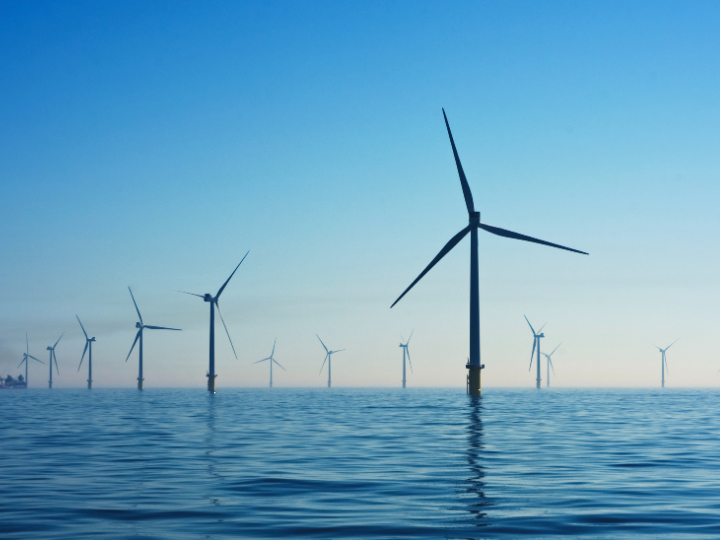by Johnny Wood
European Union greenhouse gas emissions fell 2.9% in the first quarter of 2023 compared to the same period a year earlier, despite a marginal increase in economic output, Eurostat figures show.
The EU’s member states generated 941 million tonnes of CO2-equivalent greenhouse gas emissions in the first three months of the year, down year-on-year from 969 million tonnes. The decrease happened despite a 1.2% increase in the EU’s Gross Domestic Product – a measure of economic size and health – during the same period.

Between January and March 2023, households generated 24% of the EU’s total emissions, followed by manufacturing (20%), electricity, gas supply (19%), agriculture (13%) and transportation and storage (10%). Compared with the previous year, emissions fell in five of the nine economic sectors.
Which EU countries are making progress with emissions?
So, which countries are at the vanguard of decarbonization and the transition to clean energy, and which are finding it more challenging to relinquish their fossil-fuel links?
First-quarter emissions fell in 21 of the 27 EU member states. Bulgaria achieved the biggest fall in greenhouse gases of any EU state, with year-on-year emissions down 15.2%, followed by Estonia (-14.7%) and Slovenia (-9.6%).
However, greenhouse gases increased in six EU countries: Ireland (up 9.1%), Latvia with 7.5% more emissions, and smaller increases in Slovakia (+1.9%), Denmark (+1.7%), Sweden (+1.6%) and Finland (+0.3%).
Ireland saw the biggest rise in emissions among the EU’s members, leaving the country likely to miss its climate targets by some margin, according to Environmental Protection Agency (EPA) greenhouse gas emissions projections for 2022-2040.
Analysis shows that if Ireland’s planned climate commitments and policies are fully implemented, it could produce a 29% reduction in emissions by 2030 compared to 2018 levels, far short of the 51% target stated in the country’s Climate Action Plan 2023. There are indications that agriculture, electricity, transport, industry and nearly all other sectors are set to exceed national sectoral emissions caps for 2025 and 2030, the EPA notes.
Benchmarking progress in the energy transition
Despite experiencing slight increases in greenhouse gas emissions, Sweden leads the World Economic Forum’s global Energy Transition Index (ETI) rankings, followed by Denmark. Another Scandinavian country, Norway, ranks third.
As part of the World Economic Forum’s Fostering Effective Energy Transition 2023 report, the ETI benchmarks 120 countries on their current energy system’s performance and on their enabling environment to transition to clean energy.
Analysis from this year’s report finds there has been broad progress globally on embracing clean, sustainable energy, but challenges remain in terms of the equity of the transition. This raises questions: is enough being done and are we acting fast enough?
The world has already warmed to 1.1? above pre-industrial levels, and there is a 66% likelihood that annual average near-surface global temperatures between 2023 and 2027 will exceed the 1.5? target set by the Paris Agreement, according to the World Meteorological Organization.
Across southern Europe, a ‘heat dome’ is producing the hottest temperatures of this year’s summer, while weather extremes like heatwaves and wildfires are more frequent and more intense.
A near-3% reduction in emissions represents a small step in the right direction, but more urgent action is needed to reduce our reliance on fossil fuels and maximize global efforts to embrace net-zero emissions.
*first published in: Weforum.org




 By: N. Peter Kramer
By: N. Peter Kramer
